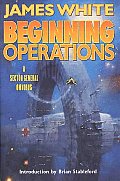
| Series: | Sector General #2 |
| Publisher: | Orb |
| Copyright: | 1963 |
| Printing: | 2001 |
| ISBN: | 0-312-87544-4 |
| Format: | Trade paperback |
| Pages: | 164 |
This is the second installment of the Sector General series, about a huge multi-species hospital on the edges of the galaxy. White reintroduces all of the characters and there isn't much ongoing plot, so it's readable on its own, but it's probably hard to find outside of the Beginning Operations Orb omnibus in which I read it (reflected in the publication information, except for the page count).
Star Surgeon is, like it's predecessor Hospital Station, a fix-up novel, but since it's a linked novelette and novella rather than five short stories, it makes the transition to a novel more smoothly. The initial section records Conway's efforts to save a hitherto unknown but highly sophisticated life form; from there, the story expands into the series' first contact with an interstellar civilization that isn't part of the Federation. None of this is as complex or deep as one would expect from the same issues tackled at novel length today, but White takes the story in a much different direction than one might expect, particularly for a book first published in the 1960s.
White's future universe reminds me most of Iain M. Banks's Culture novels. He doesn't have Banks's sophistication, or additional thirty years of SF concepts and technological development, but his Galaxy-wide civilization devoted to peace and understanding between radically different species has some clear similarities. White's Monitors, the military arm of the Federation as well as those responsible for first contact and containing wars, feel like a precursor to Banks's Contact or Special Circumstances, and their approach with this new alien civilization reads much like a less-subtle Culture novel in places. Of course, White's lead character is a doctor who is concerned primarily with the difficulties of treating an alien species, not one of the Monitors who would be taking a first-hand role in the contact, so we only see the edges and those largely in dialogue. Most of the fighting and contact work here happens off-camera while Conway is preoccupied with other things. But the sad and slightly superior attitude that the Federation takes and their absolute conviction that they can fix the problems of this small empire given sufficient time struck similar, if simplified, chords.
Those parts of this book I liked a great deal, including the long section showing Conway dealing with the horrors of war in a completely unsympathetic light. Working for Sector General is remarkably high-risk, but it's a far different type of risk than the more typical military SF. White takes some of the stock figures and idealism from military SF and turns them on their head, having them risk their lives not to kill enemies but to save enemy lives. The ending is predictable and a bit unbelievable, the story could have been done with more subtlety and characterization, but the difference in outlook is quite appealing.
Unfortunately, then there are the gender roles. I complained about this a bit with Hospital Station, but except for a few unfortunate incidents, the previous book acted as if women didn't exist. That's still sexist, but easier to deal with. Unfortunately, the same can't be said of Star Surgeon; we're treated to some painful romantic scenes, many examples of "nurse" being used synonymous with "woman," repeated commentary on women's bodies as opposed to men's minds, and most damningly some ridiculous statements about female nature that disqualifies all women from doing any of the important work in Sector General. Oh, and one must not forget (although I'd like to) the submissive damsel in distress scene where the nurse just wants to be told what to do by a firm doctor. Sigh.
This sort of nonsense is not atypical for the time period in which these stories were written (although gender treatment was getting a bit better even then), but White is so different in outlook in most other respects that it's quite disappointing. It also plays havoc with my suspension of disbelief and ability to enjoy the story. I kept cringing from some bit of sexism just as I was starting to settle into the story, and rolling my eyes at how Conway could be so accepting of and intelligent about other species and so horribly misinformed about his own.
Apart from that significant black mark, this is a better book than Hospital Station. It has a more sophisticated plot, more internal continuity, and less repetition of the same descriptions and introduction, and while the aliens aren't as varied, the drama and tension is even higher. Conway is essentially a pacifist, a character type infrequently seen in SF particularly of this era. White combines the classic SF exploration and problem-solving structure with a delightfully different motivational twist.
Follwed by Major Operation.
Reviewed: 2006-12-26